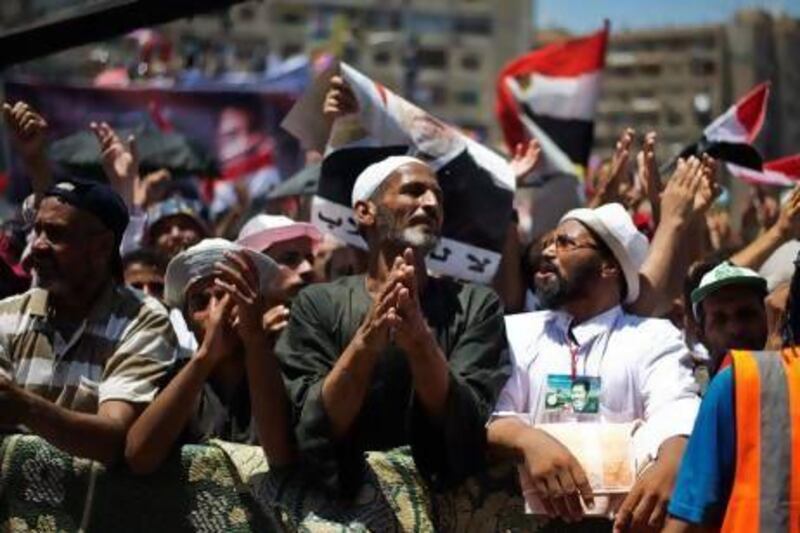CAIRO // The wife of Egypt's ousted president, Mohammed Morsi, told thousands of his supporters yesterday to remain defiant in the face of the military-backed government's threat to clear ongoing protests, promising that her husband "is coming back, God willing".
Naglaa Mahmoud was making her first appearance since her husband was removed from power on July 3 after mass rallies demanding that he stand down.
He has been held by the military authorities since then.
Wearing a flowing veil that covered most of her body, Ms Mahmoud spoke to the crowds gathered at a sit-in at Rabaah Al Adawiya mosque in the Nasr City suburb of Cairo. She delivered what she described as "good news", saying Egypt "is Islamic".
"We are victorious," she told the crowd, saying the protesters would overcome.
Demonstrators at Nasr City cheered her arrival on the makeshift stage. She did not say where she had been since her husband's downfall.
Initially, the Egyptian press suggested that she was being held with her husband at an undisclosed location along with one of her children.
Mr Morsi is being held with his top aides, a number of whom have been transferred in recent days to a prison in south Cairo.
They face charges including instigating violence in a series of incidents that led to deadly street clashes throughout the one-year duration of Mr Morsi's rule.
The ousted president's children have also joined the Nasr City protest camp and called for the release of their father.
The camp is one of two sit-ins staged by Mr Morsi's Muslim Brotherhood group and its allies. Protesters demand Mr Morsi's reinstatement, restoration of the suspended constitution drafted under his rule and the return of his Islamist-dominated legislative council, which was also disbanded.
Egypt's interim leaders and the military said they would stick with a fast-track transition plan that calls for elections by early next year.
Foreign diplomats and Arab foreign ministries, including the UAE and Qatar, have tried to mediate a peaceful resolution between the two sides. A joint statement by the US secretary of state, John Kerry and the European Union foreign policy chief, Catherine Ashton, called for a peaceful resolution to the conflict. But the interim government concluded on Wednesday that all efforts had failed and that it would end the sit-ins.
"The decision agreed on by all to clear the sit-ins is final and irreversible," said the prime minister Hazem Al Beblawim, reading from a statement issued by the Egyptian cabinet.
It was unclear what the government's crackdown on the sit-ins would entail or when it would begin, but it appeared unlikely to start until next week. The cabinet statement said that the government was keen not to take action during the celebrations that mark the end of Ramadan.
Mahmoud Abyad, a Brotherhood protester who has been camping since June 28, said that he expects the clampdown to happen soon.
"But we are not afraid. People are here to defend their country and to defend Islam," he said.





